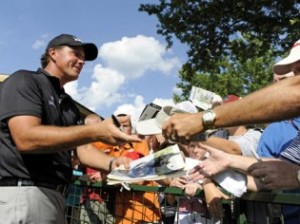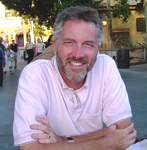 By Brad Eastland, t.s.p.
By Brad Eastland, t.s.p.
First of all, I apologize in advance for talking about golf three weeks in a row. Tis the season. (Be patient with me; maybe next week I’ll write something insightful about lacrosse or badminton or something.)
But right now, I need to talk a little bit about Phil Mickelson.
Phil Mickelson is in the middle of a great life. He’s the second-best golfer in the world. He reputedly earns well over $50 million dollars a year. He’s won 36 tournaments on the PGA tour, including three grand slam majors. His pudgy physique, coupled with an unending array of goofy facial expressions, and in contrast with the fact that the guy he’s chasing is often seen as something of a cross between Superman and an invincible golf cyborg, has rendered Phil the quintessential “everyman”, beloved by millions. He has a beautiful wife, three or four adorable children, gives away lots of his money, once even gave a fan $200 bucks to buy a new watch after one of his errant drives broke the one the fan was wearing, he is not yet even forty years old mind you, and finally he is, beyond dispute, a really wonderful, accommodating, friendly, genuinely nice guy.
He’s also an idiot.
Yes, that’s right, I said idiot. Don’t panic, that’s the same word Phil used to describe himself after his famous collapse at Winged Foot three years ago. The difference is he was venting his frustration over losing whereas I’m serious. If the definition of idiocy is doing the same dumb stuff over and over, for Philip Alfred Mickelson the shoe most certainly fits.
If it sounds like I’m upset, it’s because I am. Because as fun and entertaining as last week’s Masters tournament was and always is, it had a chance to be the greatest, the grandest, the most monumentally spinetinglingly thrilling sporting event in my lifetime. Until Phil blew it.
Here’s the set-up: Going into Sunday’s final-round action, Phil was 4-under par. The leaders were 11-under, and would wind up 12-under, which was about where most experts predicted they would wind up. Which means if Phil manages to shoot 8-under on Sunday he winds up in a playoff, and if he somehow finds a way to equal a course-record 9-under round of 63, he wins it outright. A longshot? Sure. But….
On the front nine, Phil is literally playing as good a round of golf as has ever been played. He goes out in an astonishing 6-under, tying the front-nine Masters record. The crowd is going nuts. The leaders hear the roars, see the leaderboards, smell and taste the twin flavors of defeat, and are all gagging. He pars the difficult 10th hole, and then pars the toughest hole on the course, number 11, a ridiculous par-4 measuring over 500 yards with a sloped green guarded by a lake (By the way, you know the world is going to hell when they start making 500-yard par-4s). The worst is over. With seven holes to go—including two easy par-5s fairly begging to be birdied—“Lefty” needs to shoot only three-under on the way in to pull off by far the greatest Masters comeback ever.
So as he strides to the 12th tee Phil Mickelson has the Masters, the crowd, his own legacy, Tiger Woods, and the entire golf world by the throat.
So what does he do?
He dunks his tee shot in the water.
I screamed and almost threw the remote at the TV. In fact, right before he hit his tee shot I was already screaming at him, when the announcer mentioned that he was hitting a 9-iron. I knew it was the wrong club. Woods had just hit an 8-iron that barely cleared the steep bank guarding the green which sucks everything into the drink. Phil loves hitting a more lofted club than El Tigre, as if proving he’s the longer hitter and therefore, I guess, more manly. But what he did violated the most inviolate rule of Augusta National—YOU MUST NOT, UNDER ANY CIRCUMSTANCES, PUT THE BALL INTO THE WATER ON TWELVE!!! Not if you want to win.
The 12th hole at Augusta—the most famous par-3 in the world—has an unfair reputation for toughness. It’s a tough hole, sure, but not that tough. It’s only about 150 yards long, for one thing. The 12th is like an attractive woman preying upon the frailties of a man, of all men (if you’ll permit me a hackneyed but apt metaphor). The pin looks close enough to touch, so beguiling, the yellow flag flapping in the wind like an intoxicating strand of blonde hair. It seduces the golfer into hitting the “right” club. Except that the right club on twelve is usually one club stronger than what the raw yardage suggests. You need just a little extra length on twelve, to make sure a tentative stroke or a gust of wind doesn’t knock the shot down and right into Rae’s Creek. Just aim for the back of the green, miss it long, that’s the winning formula. Even if your shot is over the green, a player with a good short game (Phil’s short game is the best in the world) will almost always make par, a bogey at worst.
But having found the water, a stroke-and-distance penalty led to a double-bogey five, and the hopes and dreams of Phil and Philfanatics everywhere of winning the 2009 Masters were instantly gone.
That’s always been Mickelson’s trouble. He’s too confident, too bold, a poor decision maker. (The other day my kid asked me about Van Gogh. I said, “Van Gogh? Well, he never sold a painting, cut off his ear, and then killed himself. He was a talented guy who made poor decisions. That makes him the Phil Mickelson of the 19th century!) But worse than all that, Mickelson is a man seemingly incapable of change. On eighteen, still having a slim chance of getting into a playoff and needing a birdie, he did it again; the shape of the hole called for a 3-wood. Manly-man Phil pulled driver, reached the fairway bunker, and a possible birdie turned into a bogey. Idiot….
What might have been. Oh, what might have been. A possible back-nine thirty-three or maybe even a thirty-two turned into an ugly thirty-seven. A course-record kaput. A Masters blown. A transcendent moment in golf history squandered.
So the question is, why does Phil keep doing this? At the U.S. Open in 2006 (the aforementioned collapse at Winged Foot), he managed to make the three worst decisions of his golfing life on three consecutive shots. He pulled driver instead of 3-wood on eighteen there too. Hit it onto a corporate hospitality tent. Then he tried to hit a short iron off of pine straw and over a tree right in front of him, rather than pitching out into the fairway. Hit the tree. Tried the same shot again. Missed the tree but found the deep rough. Pitched over the green into more rough. Double-bogey. A one-stroke lead turned into a one-stroke defeat in fifteen short, agonizing minutes. Not to mention the everlasting golf infamy that goes with it.
Doesn’t he have people he can talk to? Coaches? Psychologists? Oracles? Probation officers?
Golf is a fascinating sport because it exposes a man’s frailties. Phil’s frailties are hubris, over-confidence, and stubbornness. He seems incapable of genuine change. Apologists for Phil will often recite that old cliché, “people don’t change, you are who you are”. You’ve heard that one, right?
Not true. Not necessarily. Take my dad. Like a lot of guys born and raised in the Midwest back in the day, he grew up with a fear and a lack of understanding of homosexuality, and was pretty much as homophobic as the next guy. But due to a series of epiphanies and a genuine desire to be the best person he could be he changed, he reasoned it out that there should be no victimless crimes, and for the final twenty years of his life he was an ardent supporter of gay rights. I was so proud of him for that.
Regarding politics, he was a guy (like most) who always voted with his political party. But in 2004, he reasoned that his party’s presidential nominee, the sitting president, had done too poor a job to warrant reelection. So for the first and last time in his life, he voted against party. As with the gay thing, he demonstrated flexibility. He showed once again he was capable of genuine change. That’s a pretty cool thing to be able to do at age 81. (Of course by way of cancelling out my dad’s vote, sixty million other folks did vote for the president and he was reelected, but that’s another column.)
I don’t know why Phil Mickelson hasn’t shown a greater capacity for change. Or ANY capacity for change. You’d think after Winged Foot he would have learned his lesson. Last week at Augusta proves he hasn’t. Until he does he’ll never climb golf’s Olympus and stand on the summit alone. He’ll be just another pudgy guy with a goofy grin and a sweet swing.
Moral of the story? Easy. If you want to become a good golfer and make a lot of money, copy Phil Mickelson. But if you want a role model for making good decisions in life and for finding the courage to employ the necessary flexibility to actually improve, don’t pick Phil as someone to emulate. You can do a lot better. Pick my dad. You could do a lot worse.
http://www.bosonbooks.com/boson/fiction/gamble/gamble.html
http://www.bosonbooks.com/boson/fiction/basket/basket.html
http://www.bosonbooks.com/boson/freebies/freebies.html
 The Sports Philosopher
The Sports Philosopher



2 Responses to “Lingering Memories of the Masters: What We Can All Learn From Phil Mickelson”
Trackbacks/Pingbacks
Leave a Reply